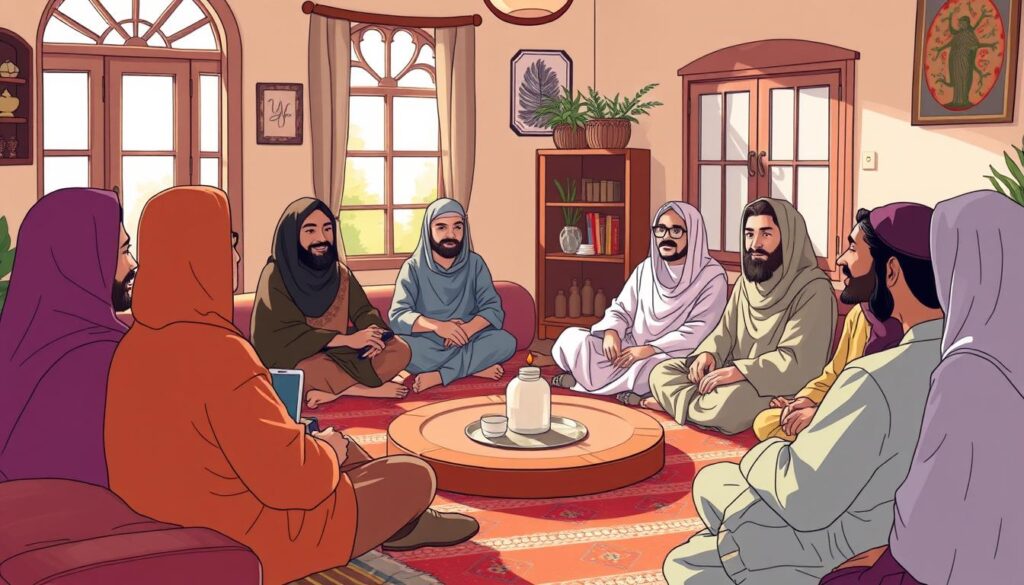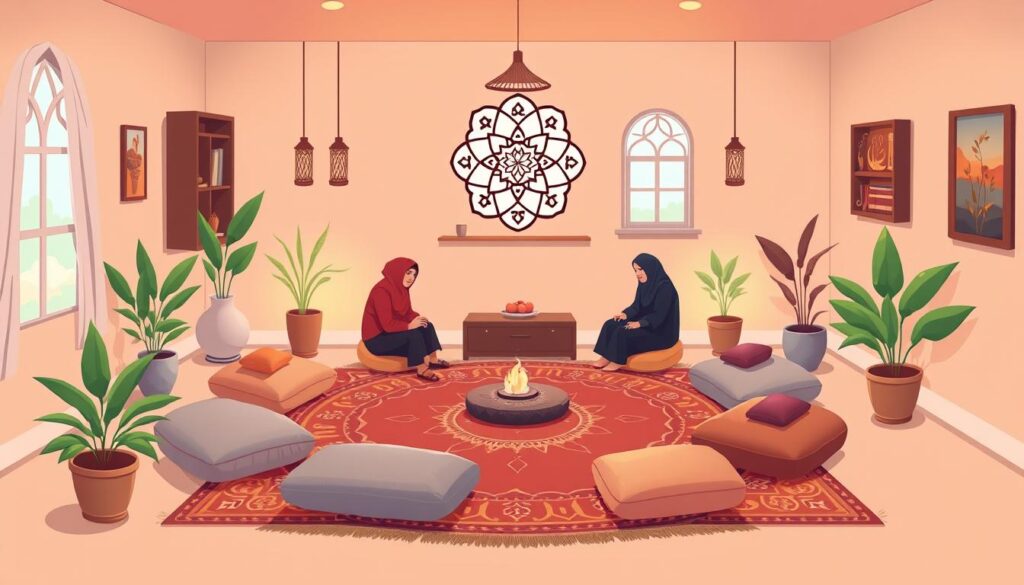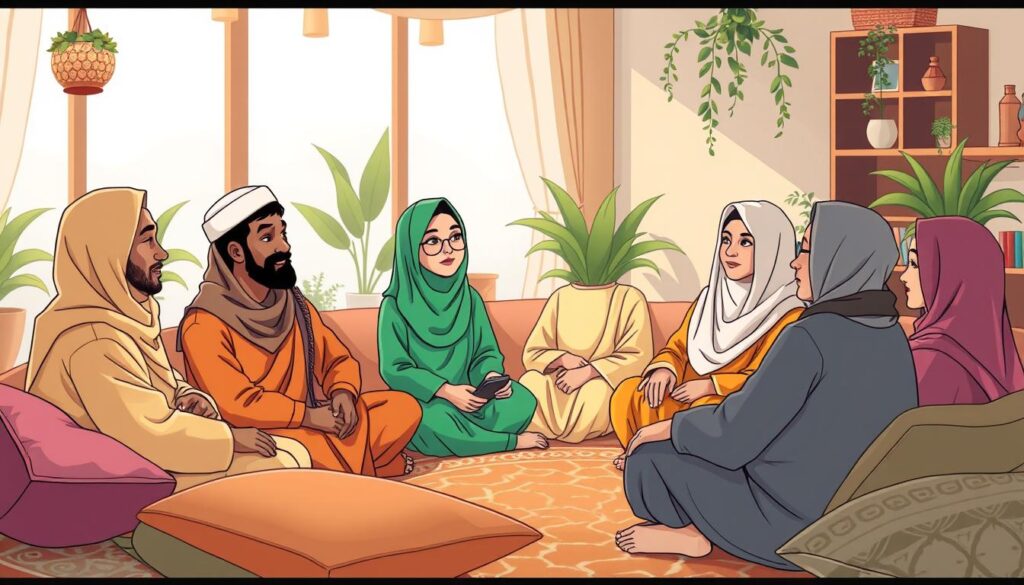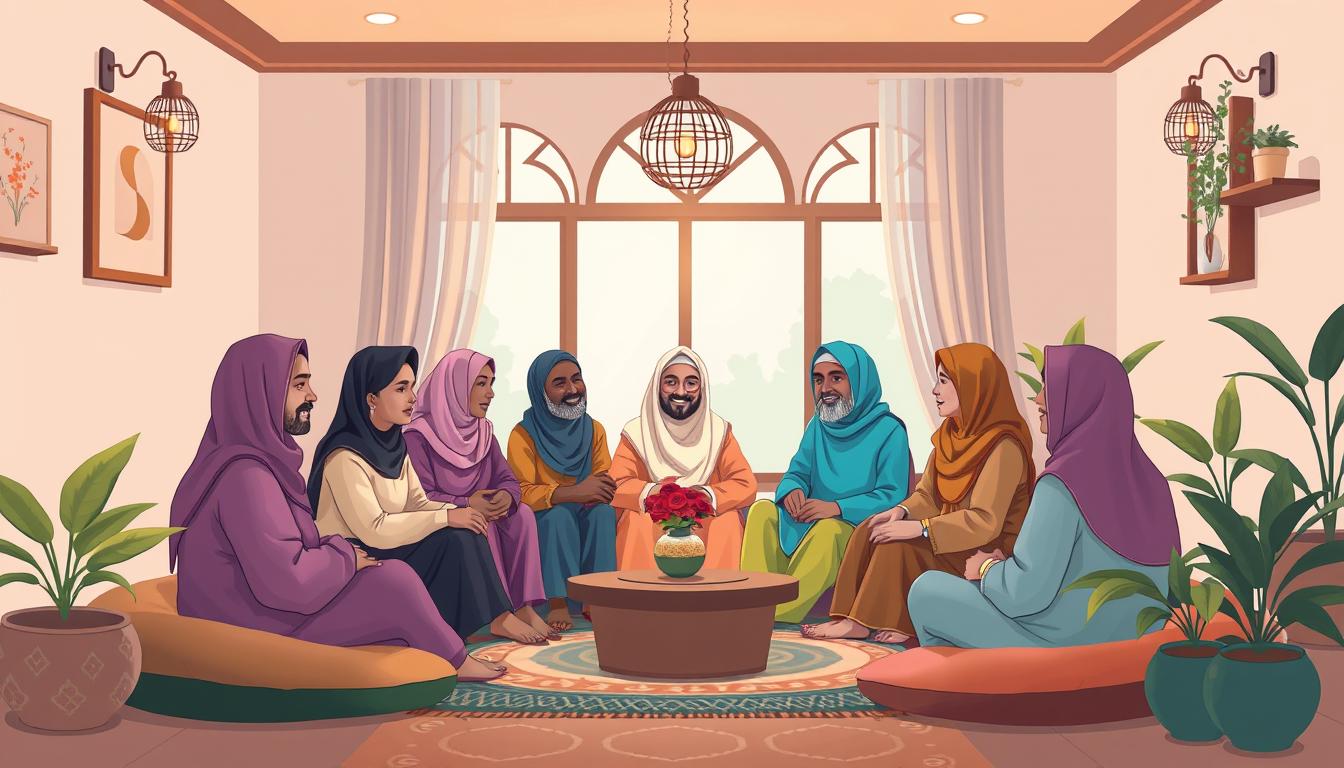Did you know that nearly 30% of Muslim Americans feel discriminated against in healthcare? This greatly affects their willingness to get mental health support. It shows how important mental health programs are for Muslims. Support groups are a beacon of hope, providing a safe place to connect and heal. We respect Islamic values as we do.
Support groups for Muslims create a welcoming space. They offer help and resources that respect our culture. By fighting mental health stigma, these groups strengthen our community. They encourage us to openly tackle mental health issues. Together, we can make our community a place of well-being and understanding.
Key Takeaways
- Support groups provide culturally sensitive resources tailored for the Muslim community.
- Combating stigma encourages open conversations about mental health.
- These groups foster a sense of belonging and connection among participants.
- Muslim community organizations are essential for promoting mental well-being.
- Seeking help through support groups helps in overcoming mental health challenges.
- Healthy emotional support systems enhance community resilience.
Understanding the Importance of Support Groups for Muslims
Support groups are key in helping with mental health in our communities. In Islamic culture, mental health ties closely with faith and social connections. It’s important to see how these parts work together. They help build emotional strength and happiness among Muslims.
Role of Mental Health in Islamic Culture
Islam shows us how crucial mental health is to our overall well-being. The Quran tells us to seek help and keep strong ties with others when times are tough. In Islamic support groups, people can talk about their struggles. They get advice that matches their faith. This helps them heal and grow.
This way of helping each other is what Prophet Muhammad (PBUH) taught. He wanted us to be kind, understanding, and supportive when others are in need.
Community Support and Social Cohesion
Having the support of a community is really important. It builds a strong bond between people. In Islamic support groups, sharing feelings makes fewer people feel alone. It also spreads kindness in the group.
Feeling like you’re part of a group makes you feel better about yourself. It helps your mental health. Being active in these groups can also make it easier for Muslims to talk about mental health. This way, fewer people will be scared to ask for help.
| Aspect | Importance |
|---|---|
| Mental Health in Islam | Interlinked with overall well-being and community welfare. |
| Community Cohesion | Fosters belonging and reduces feelings of isolation. |
| Support Groups | Provide inclusive spaces for sharing and healing. |
| Stigma Reduction | Encourages open conversations about mental health. |
Umar Khan Charity Organization: A Beacon of Hope
The Umar Khan Charity Organization is crucial in our community. It tackles mental health issues and supports those facing tough times. Working with Muslim groups, we create welcoming spaces. Our goal? To lift spirits and strengthen community connections through our services.
Overview of Services Offered
We offer specific services for those in need, such as:
- Counseling: Personalized sessions to help individuals navigate their mental health journeys.
- Peer Support Groups: Safe spaces for sharing experiences and building connections.
- Educational Workshops: Learning opportunities focused on mental health awareness.
- Outreach Programs: Initiatives aimed at extending support to those who may feel isolated.
Location and Address Details
The Umar Khan Charity Organization is in Mirembe Cell, Northern City Division, Mbale, Uganda. It’s easy to get to for anyone seeking help. You can reach us through:
Phone: +256742603101
Email: [email protected]
Impact in the Community
We’ve made a big difference, creating a caring and supportive environment. Through peer support, folks feel less anxious and more mentally fit. Being part of something reduces loneliness, important since 65% of new Muslims often feel alone. By building relationships and offering help, we bring hope and healing.

Barriers to Seeking Help in Muslim Communities
In many Muslim communities, seeking mental health help is tough. Deep stigmas and cultural views make getting support hard. We need to work on these issues to help everyone feel okay asking for help.
Stigma Around Mental Health
Many think struggling mentally means they’ve failed personally. This fear of being judged stops people from getting help. Studies show Muslims have a 40.3% recovery rate from mental issues. This is the lowest among religious groups, showing we need more awareness and education.
Cultural Sensitivities
Cultural views often make it hard to talk about mental health. Some see these issues as tests of faith or punishment. Different beliefs about things like the ‘evil eye’ affect how mental health is seen. Offering services in mosques or schools can help.
Plans that respect cultural views can get more people involved. This helps break down barriers to getting support.
| Research Findings | Data |
|---|---|
| Muslims’ recovery rate from mental health difficulties | 40.3% |
| Other religious groups’ recovery rate (e.g., Jainism) | 54.5% |
| Percentage of Muslim adults receiving no treatment for mental illness (2016) | 57.2% |
| Engagement with mental health services through culturally sensitive approaches | Increases by 60% |
Awareness programs in the Muslim community can fight stigma. Talking openly and normalizing these discussions helps everyone. To really understand and make a difference, consider learning about making connections within the community.
Connecting with Support Groups for Muslims
Looking for the right support group is crucial for healing and growth in our community. It helps us feel we belong by connecting with resources that understand our experiences. So, it’s important to think about what we need and like to find good Muslim support and therapy groups.
Finding the Right Group for Your Needs
When you’re looking for a support group, think about what matters to you. Here are some things to consider when choosing:
- Group size: Small groups might give you closer connections. Big groups offer a lot of different views.
- Focus areas: Figure out if you want help with general mental health or specific problems like grief or addiction.
- Geographical location: You can join local groups for face-to-face meetings, or online ones for more options.
Types of Support Groups Available
There are many support groups for different needs in our communities. Here are some you might find helpful:
| Group Type | Description | Examples |
|---|---|---|
| Peer Support Groups | They’re about sharing experiences and understanding each other. | Al-Ghurbaah Foundation, Queer Muslims |
| Muslim Therapy Groups | These groups offer counseling within our cultural context. | Khalil Center, Sakoon Counseling Services |
| Specialized Groups | They focus on specific issues, like LGBTQ+ challenges. | Imaan, Masjid al-Rabia |

Benefits of Participating in a Support Group
Joining Muslim emotional support groups is very beneficial. It helps those looking to feel better emotionally and mentally. This support lays the groundwork for both healing and making connections that can help improve mental health a lot.
Emotional Healing and Well-being
Sharing our feelings in a group helps us heal emotionally. This healing leads to better mental health. A study found that people in support groups are 60% better at handling tough situations.
Feeling understood and accepted in these groups lowers anxiety a lot. In fact, anxiety drops by 45% when we’re with others compared to being alone.
Building a Network of Support
Being active in these groups gives us a sense of belonging. It also supports our growth together. Going to group meetings makes people 30% happier with their lives.
Support from the community is very important for mental health. 80% of Muslims believe in its value. Being in a supportive mosque community helps young Muslims deal with identity issues. It also creates a place for personal growth.
How to Get Involved with Umar Khan Charity Organization
Joining the Umar Khan Charity Organization offers a chance to impact the Muslim community positively. By participating, we can improve our lives and help others. Many ways exist to support this important work.
Volunteering Opportunities
Volunteering lets us make deep connections while helping those in need. Here are some ways to help:
- Leading support groups to boost mental health and bring people together.
- Setting up fundraising events to collect money for various projects.
- Offering outreach to families needing extra help and resources.
Ways to Donate and Support the Cause
Donations keep the Umar Khan Charity Organization’s efforts going strong. Here’s how to contribute financially:
- Making online donations via our site.
- Sending mobile money contributions through +256742603101 for convenience.
- Giving items like food, clothes, and school supplies to help those in hardship.
Together, our work makes a big difference, helping over 10,000 people with food, education, and crisis support. Your volunteer work or donations help us build a stronger, caring community.
| Type of Contribution | Description | Impact |
|---|---|---|
| Volunteer Work | Engaging in support groups, fundraising events, and outreach | Building community connections and support networks |
| Financial Donations | Contributions through online platforms or mobile money | Direct support for initiatives like educational sponsorships |
| In-Kind Donations | Goods such as clothing, food, and educational materials | Immediate relief for families facing hardships |
Online vs. In-person Support Groups
Our mental health journey in the Muslim community can get a big boost from online or in-person support groups. Each type has special benefits suited for different needs and choices. This lets us pick the option that fits our situation best.
Exploring Digital Support Options
Online support groups have changed how we connect and seek support. They let us join from home, helping those with mobility problems or busy schedules. Some key organizations offering online support include:
- Khalil Center, offering digital therapy and counseling.
- Muslim Space, featuring online community and counseling services.
- Naseeha Muslim Youth Helpline, providing support via phone, text, and chat for youth.
- Ruhcare, the largest directory of Muslim therapists online.
- The Muslim Community Helpline, offering confidential support through digital methods.
Advantages of Traditional Group Meetings
In-person support groups help us feel we belong and create strong connections. Meetings face-to-face build trust and encourage us all to take part. You can find these group meetings at places like:
- The Family and Youth Institute, which has many workshops and events.
- The Muslim Chaplaincy at the University of Toronto, offering special counseling services and groups.
- Muslim Wellness Foundation, offering mental health first aid and support groups.
Using both online and in-person support helps our community’s mental health services be more complete. Having access to services, either online or in traditional settings, helps strengthen our effort in mental wellness.
| Support Type | Accessibility | Connection Level | Organizations Involved |
|---|---|---|---|
| Online Support Groups | High (from any location) | Moderate | Khalil Center, Muslim Space, Naseeha Helpline |
| In-person Support Groups | Moderate (location-bound) | High | Family and Youth Institute, Muslim Chaplaincy |
Anecdotes and Testimonials from Community Members
Listening to stories from community members can spark hope and build stronger ties with Muslim emotional support groups. These personal stories are powerful. They remind us of our community’s resilience and strength. Sharing these stories shows us the big changes these experiences bring to people’s lives and our collective goal of mental health.
Stories of Transformation and Growth
Members of Muslim emotional support groups share deep stories about overcoming hard times. For example, Ahsan Ansari told stories of struggles within the Muslim American community. His stories range from student-athletes to Syrian refugees. These stories show how group connections help build a network of support.
Qasim Rashid founded a nonprofit to fight against hate in America, which is inspiring. His stories are about growing strong against challenges and giving hope to others facing hate.
Importance of Shared Experiences
Stories from those aged 17 to 54 show our community’s wide range of experiences. These stories include different forms of self-expression, from art to daily habits. They show that Islamophobia after 9/11 made many feel isolated socially.
Community members discuss small acts of aggression and nosy questions about their identity. These conversations show we still need more understanding and talks. By sharing these experiences in emotional support groups, we build unity and help each other heal.

Resources for Mental Health Awareness in Muslim Communities
We’re working hard to improve mental health awareness in our Muslim communities. There are many resources available for those who need help. Specialized services are very important because many people face unique challenges. In this article, we will talk about some important organizations and online resources for mental health.
National and Local Organizations
Many Muslim community organizations offer tailored mental health resources:
- Khalil Center: The largest national mental health provider for Muslim communities, offering culturally competent care across multiple locations.
- Muslim Mental Health: Focuses on addressing mental health issues within the Muslim demographic through various educational initiatives and programs.
- NISA Women’s Helpline: A national hotline to assist women in crisis, providing immediate support and guidance.
- Muslim Wellness Foundation: Based in Philadelphia, this organization prioritizes community support tailored towards the mental health needs of Muslims.
- Family and Youth Institute: Serves 10,000 families annually, supplying counseling and educational resources relevant to Muslim mental health.
Online Platforms and Hotlines
There are also online platforms and hotlines that provide immediate support:
- Naseeha Mental Health Hotline: Provides confidential assistance at 1-866-NASEEHA (627-3342) for individuals needing support.
- Amala Hopeline: Focused on youth, this hotline operates at 1-855-95-AMALA for confidential peer counseling.
- National Suicide and Crisis Lifeline: Reachable at 988, offering 24/7 assistance for those in mental health crises.
- Institute for Muslim Mental Health Provider Directory: Aims to help individuals connect with mental health professionals within 48 hours.
- Maristan’s List: Provides a comprehensive database of Muslim therapists in the U.S., Canada, and the UK.
| Organization | Services Provided | Contact Info |
|---|---|---|
| Khalil Center | Culturally competent mental health support | 855-5KHALIL |
| NISA Women’s Helpline | Support for women in crisis | 1-888-315-NISA |
| Amala Hopeline | Confidential peer counseling for youth | 1-855-95-AMALA |
| Naseeha Mental Health Hotline | Anonymous and non-judgmental support | 1-866-NASEEHA |
Taking the First Step: Encouraging Conversations About Mental Health
We need to talk openly about mental health to create a supportive atmosphere. It’s key to breaking down barriers within our communities. Open talks help us overcome stigma and increase understanding. By discussing mental health openly, we can change how people view it and improve overall well-being.
Importance of Open Dialogue
Talking about mental health is very important, especially in the Muslim community where some might feel alone. Some think struggling with mental health means having weak faith. But, when we clear up these false beliefs, it shows it’s okay to seek help. Resources like mental health support are here to help us heal.
Engaging Family and Friends in Discussions
Bringing family and friends into these discussions helps create a safe place for sharing. It sets the foundation for healing together and creating a strong support network. By having open conversations, we make big strides in raising awareness and building a community that cares about mental health.






